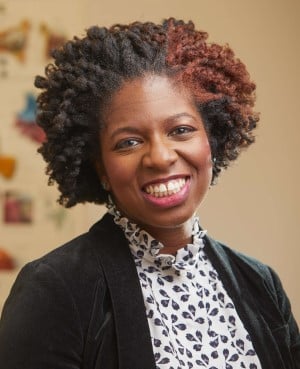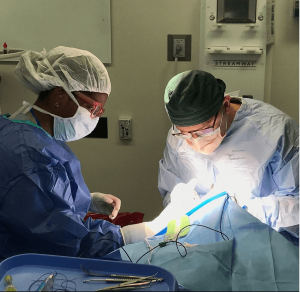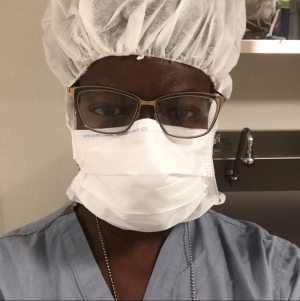Celebrating Black History
Kristen Nwanyanwu, MD, MBA, MHS ― The connection between public health and ophthalmology
 Kristen Nwanyanwu, MD, MBA, MHS, graduated with highest honors from the University of Michigan. Her degrees in African-American Studies and biochemistry became the foundation for her career as a health disparities researcher. At the University of Pennsylvania, she earned her medical degree and MBA from the Wharton School. A board-certified ophthalmologist and a practicing vitreoretinal surgeon, Nwanyanwu completed her residency at the University of Michigan and a vitreoretinal surgery fellowship at Illinois Eye and Ear Infirmary at the University of Illinois Health (Chicago, Ill.).
Kristen Nwanyanwu, MD, MBA, MHS, graduated with highest honors from the University of Michigan. Her degrees in African-American Studies and biochemistry became the foundation for her career as a health disparities researcher. At the University of Pennsylvania, she earned her medical degree and MBA from the Wharton School. A board-certified ophthalmologist and a practicing vitreoretinal surgeon, Nwanyanwu completed her residency at the University of Michigan and a vitreoretinal surgery fellowship at Illinois Eye and Ear Infirmary at the University of Illinois Health (Chicago, Ill.).
After joining the faculty at Yale, Nwanyanwu was selected for the YCCI (Yale Center for Clinical Investigation) Junior Faculty Scholars Program through which she completed her Master of Health Science with honors. Currently an associate professor of ophthalmology and visual science, she is the PI for the NIH-funded Sight-Saving Engagement and Evaluation in New Haven (SEEN) Program ― a multi-method approach to identifying and addressing health disparities in diabetic retinopathy. Nwanyanwu has lectured nationally on health disparities, access to care, and the surgical management of diabetic retinopathy.
Tell us a little about yourself
I am from Ann Arbor, Mich. I was raised by a father that taught AP calculus and a mother who was a middle school counselor. I always wanted to be a doctor ever since I was a child. I even have a fifth-grade essay about wanting to major in biochemistry and going to medical school. Additionally, every time something medical happened at home, I was the one to go and figure it out; leading to my father calling me Dr. Harris when I was a kid.
Before I was born, my brother developed a brain tumor. Growing up, I spent a lot of time helping to take care of him as much as I could. It led me on the path to neuroscience. Though, as a medical student, eye and vision sciences was my favorite subject to teach my classmates.
I believe the elevation from my dad and being in a house that needed a lot of health care pushed me in the direction of being a doctor. Additionally, I was always an advocate like my grandmother. She advocated for people that didn’t have anything, such as offering essentials to children and their families, as the owner of a grocery store. I have taken that with me throughout my life.
I went into medicine for the people, for the privilege to explain people’s health to them. To be able to stand in that gap is a gift to me.
What surprised you the most when you started out in this field?
How much there is to learn. I relish the opportunity to deep dive into one organ. That was essential to me when I was trying to figure out what I was going to do.
I love ophthalmologists; they are the happiest surgeons. I’m an extrovert, I love learning, and I have a lot of energy. When I was on my general surgery rotation, the others looked at me strangely. However, when I was in ophthalmology, I knew they were my people.
In ophthalmology, I don’t have to be in the hospital all day. I can pursue other interests of mine such as activism, research, mentoring, and more.
What is your greatest achievement?
My children are my greatest achievement. I have two girls, ages six and four, and they are just fantastic. Watching them be who they are and leaning into whatever gifts that God has given them, is just a blessing. Then being able to shore them up with the resources and the privileges to be able to do what they’re supposed to in this world is awesome. I remember when my six-year-old was learning how to read and how proud of her I was because when you read, you can navigate the world. My children speak their truth, and I’m grateful for any part that I play in that.
 Do you have a role model? If yes, who?
Do you have a role model? If yes, who?
My beautiful mentor, Dr. Marcella Nunez-Smith. She’s amazing! She always tells me, “Bring your whole self. There’s nothing you can’t say.” She is very senior and makes space for me to be myself. She taught me how to be in many spaces, especially uncomfortable spaces, and to say things that need to be said. I didn’t even know I could be a health equity researcher until I met her. I thought I had to do that on the side until she told me I could have an entire career as a health equity researcher.
Have you encountered obstacles throughout your career?
Many obstacles...one of them being making health equity visible in ophthalmological research. Ophthalmology and public health have always been tied together. We have always been enacting screenings, cataract outreach, surgeries, etc., but we have not been doing it equitably. For example, we've been able to treat diabetic retinopathy for 40 years, but it's still a leading cause of blindness. And we know that our Black communities, our indigenous populations, our Latino communities along with communities that have low resources, all go blind more than everyone else. They are diagnosed later, they have more severe disease, and they're more likely to go blind. Measuring equity is how we should evaluate our success, yet we don’t. Back when I was in training, inequities were just accepted. I would ask why are there these racial disparities, and people would say, 'you know why.' The answer was racism. At that time, it seemed like everyone was fine with a subset of the population having worse vision just because of the color of their skin. That’s racism.
Now one must dig deep and ask questions. For example, what does it look like when we challenge our systems? When we challenge our systems of advantages and disadvantages, pressure them, and see how we change them. How do we identify what the pressure and pain points are for our communities to achieve their best health? Finally, you get science to show how systems can grant communities access to the best vision care in equitable ways. That part is implementation science; that is the work that I do. That's the work that I'll continue to do.
In your opinion, what obstacles do members of the African diaspora still face in this industry?
Racism. Black people face a complex, intrenched system of disadvantages and yet continue to offer invaluable gifts to society. Dismantling that system is daunting, but necessary for our societies to achieve their full potential.
I always remind people that systems that are in place weren’t designed for a Black woman scientist/retina surgeon from Ann Arbor, Mich. When they created some of these institutions or academic handbooks, they didn’t have someone like me in mind. Back when they were designing medical school curriculums, we weren’t in mind, so it makes sense that I don’t fit there. Fortunately, now they’re trying to develop these schools, resources, systems, etc., for people like me and others. There is strong opposition, but greatness is on the other side.
Have you noticed changes in the field as you advanced?
Ophthalmology is just starting to acknowledge inequity, both in eye care and the field.
 We’re in the age of the MOM Program from the American Academy of Ophthalmology and the Rabb Venable Program from the National Medical Association, which I was a part of. More people are championing inclusivity, the next generation scientist and science that advances equity. For example, we have Drs. Mildred Olivier, Eddie Miller Ellis, O’Rese Knight, and Dolly A. Padovani-Claudio, who have been advancing the work of equity, inclusivity and science. We have the work of Dr. Angela Elam and the AAO Taskforce on disparities, plus a beautiful cohort of up-and-coming scientists in training that are really going to advance equity in our beloved ophthalmology.
We’re in the age of the MOM Program from the American Academy of Ophthalmology and the Rabb Venable Program from the National Medical Association, which I was a part of. More people are championing inclusivity, the next generation scientist and science that advances equity. For example, we have Drs. Mildred Olivier, Eddie Miller Ellis, O’Rese Knight, and Dolly A. Padovani-Claudio, who have been advancing the work of equity, inclusivity and science. We have the work of Dr. Angela Elam and the AAO Taskforce on disparities, plus a beautiful cohort of up-and-coming scientists in training that are really going to advance equity in our beloved ophthalmology.
However, we still need more resources and funding to advance the next generation of black and brown ophthalmologists. We also need more organizations willing to collaborate with one another.
Where do you see yourself in five years?
In five years, I see myself closer to decreasing preventable blindness caused by diabetic retinopathy.
What is the best advice you have ever heard and abide by?
You have everything you need.
What does Black History Month mean to you?
I celebrate Blackness all year round. For this month, the rest of the country gets that privilege.
